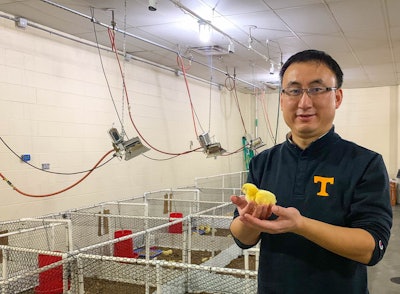
Researchers at the University of Tennessee Institute of Agriculture (UTIA) were awarded a $1 million grant to develop a computer vision system to monitor broiler welfare- and production-related behaviors.
“Based on our experience, the camera system is one of the most promising systems to monitor broiler behavior,” explained lead investigator, Yang Zhao, an assistant professor in the UTIA Department of Animal Science
The project, which received funding from the Agriculture and Food Research Initiative, a competitive grants program of the U.S. Department of Agriculture (USDA) National Institute of Food and Agriculture (NIFA), could help broiler growers improve flock management at commercial farms.
Computer vision identifies, analyzes poultry behaviors
Computer vision involves lightweight deep learning techniques and algorithms to automatically identify the welfare-related comfort behaviors, including preening, dustbathing and stretching, as well as the production-related behaviors, such as eating and drinking, of individual birds.
Artificial intelligence and video imaging analysis will allow researchers to collect and assess this information and compare it to different management practices.
Computer vision and precision poultry farming technology are exciting innovations, but it’s important that research focuses on finding ways to implement their findings in commercial settings, Zhao said.
“We want something that can be implemented in the field, which can benefit the broiler growers and integrators, and the profits of the farm,” he added.
The technology is designed to be affordable and practical for commercial use, with an estimated cost of $2,500 per house. The research team expects to have a working prototype available for demonstration in 2025.
Technology tools to monitor poultry welfare
The computer vision project builds on previous research involving the use of a multi-angle and multi-range camera system to monitor commercial broilers at both the individual and flock level, which was named one of the Phase 1 SMART Broiler winners in 2020.
The SMART Broiler program, run by the Foundation for Food and Agriculture Research and McDonald’s, awarded more than $4 million in grants and technical support to develop automated monitoring tools that precisely assess chicken welfare.
Other researchers on the project include Maria Prado, also of the Department of Animal Science, as well as Robert Burns, Hao Gan, Shawn Hawkins and Daniel Berckmans, of the Department of Biosystems Engineering and Soil Science. Hairong Qi, from the UT Department of Electrical Engineering and Computer Science, is also assisting on the project.


















